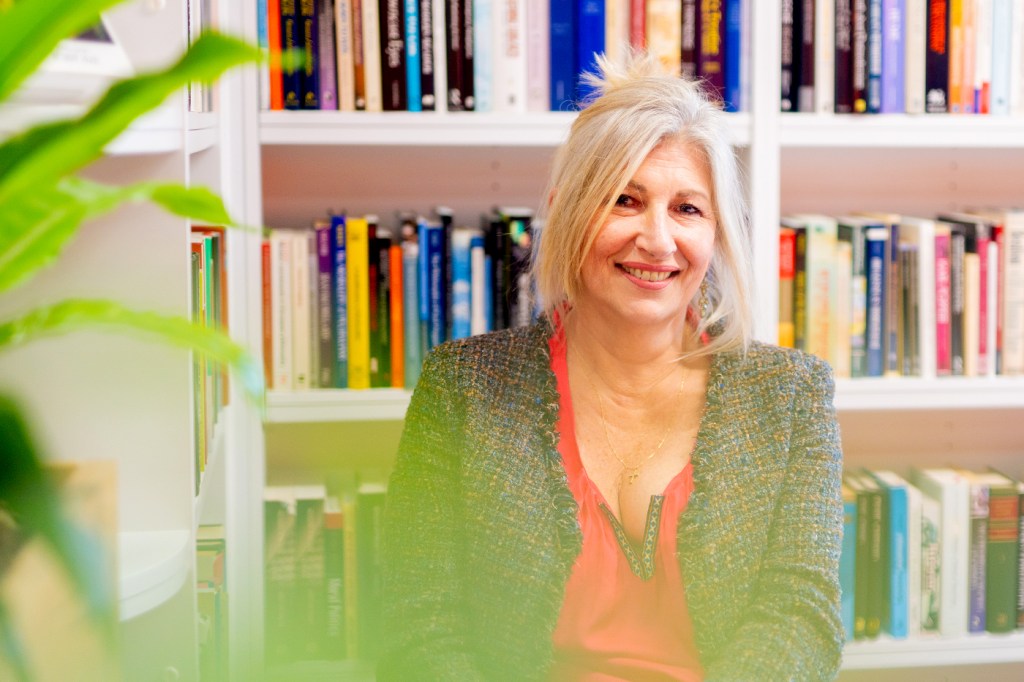Writing course, designed by Northeastern professor, helps with isolation and anxiety. Now it’s being rolled out across the UK
Deborah Walker’s “Writing for Self-Expression” course has expanded from a one-off pilot to more than 35 National Health Service-funded locations in just two years.

LONDON — When a woman logged on remotely to a writing course run by Northeastern University assistant professor Deborah Walker, she had not left the house in 10 years.
An eating disorder had fueled her crippling anxiety.
But after taking “Writing for Self-Expression” — a class designed to foster personal awareness, resilience and well-being — something in her changed.
“After the course, she left her house and went to Slimming World [a weight management support group],” says Walker, who teaches creative writing on Northeastern’s London campus.
“I nearly cried when I found out. Can you believe that? The fact that she had been too embarrassed to leave her house for years. This is what I say [about conditions such as anxiety] — the longer it goes on, the worse it gets, the more entrenched people become in their isolation.”
That is not the only success story.
A man suffering from chronic anxiety took Walker’s Writing for Self-Expression class. Within 18 months, he had taken up cycling and started performing his poetry publicly.
“He used to come in with his head down,” Walker remembers. “He couldn’t look at you, he just couldn’t look anyone in the eye.
“But he wrote the most beautiful poetry. He then came back on the next course with more gorgeous stuff. And I said, ‘Come on, you’ve got to do something with this.’
“About six months later, he turns up again in cycling gear. He has remade himself as ‘Lycra Man.’ His head’s held high, he’s doing open mic nights, he’s got his work on the wall of the Oxford Poetry Library. I mean, he’s just completely reborn.”
The pair are just two out of hundreds of participants who have benefited from Walker’s classes.
Having started as a pilot at the Oxfordshire Recovery College in January 2022, the course has since been rolled out by the National Health Service to another 35 U.K. Recovery Colleges — institutions that offer well-being services.
The work is being funded by the Royal Literary Fund, a 230-year-old charity that engages in public education and where Walker is a fellow.
Walker’s experience of the benefits of Recovery Colleges is firsthand. She was diagnosed with type 2 bipolar, a condition that can affect someone’s mood, almost two decades ago.
After an episode brought on by her condition three years ago, she enrolled in a course at the Oxfordshire Recovery College. While there, she saw an opportunity to produce a writing program in collaboration with the Royal Literary Fund.
Featured Posts
The first two series of sessions went so well that the charity agreed to front the money for its expansion, with Walker training other writers to lead their own versions in different corners of the country.
“It is definitely more of an art than a science, but the results have been surprising and delightful, I have to say,” Walker says. “It has just taken off like a shot.”
Walker says she settled on a “simple formula” for the Writing for Self-Expression content to ensure people of all educational backgrounds can take something from it.
She selects poems and the class reads and talks about how they make them feel. Walker, a travel writer and novelist, then selects a line or two and asks the class to “free write.”
“I tell them, ‘Just let rip.’ And whatever comes out, comes out. Some people write in rhyming couplets and it is incredible,” Walker says.
“Other people who aren’t as literate can just manage the odd word or bullet points. But it is all about what is immediate and what comes up from them in that moment, so it is really expressive. They are getting a lot of crap out. There are tears and there’s laughter — it’s just wonderful.”
Walker, who has worked at Northeastern since 2021, says she found the early sessions to be an “amazingly alive experience.”
“I’d come out of there and I would be on a complete high,” she says. “And I was trying to work out, why is this so satisfying? And I think it is because what I experienced in that room was pure human connection.
“Knowing that we are all in the same boat just encourages this incredible sense of fellowship.”
Katharine McMahon, head of outreach at the Royal Literary Fund, says the charity was “really delighted” when Walker approached it about funding her course.
She explains that the organization saw it as a way of helping people to “find ways of using writing to process experience or memory, and to share their feelings”.
“The thing about it is that nobody cares whether you write one word or 50,000, or whether you speak or whether you don’t,” says McMahon.
“It is just about being there in the room with the trust of the group and the writer who is leading the course being very supportive, kind but also very professional. And I think all those things combine to make it a very valuable experience for people.”
Walker has been putting pen to paper for decades. In the late 1980s, she moved to San Francisco where she was based while writing at least three editions of the “Rough Guide to California” for the British travel book series.
After moving back to the U.K., she put her mind to writing novels. Her book “Let Me Count The Ways” was longlisted for the Booker Prize, a prestigious British literary prize, in 1997. She was later involved in putting together souvenir tour books for, among others, well-known chef James Martin and British survival expert Bear Grylls, while also working as a ghostwriter.
Her foray into producing well-being writing courses is the latest turn in a diverse career. Its success is something she is reluctant to accept praise for, however.
“I take no credit for this because all I am is the person sitting there — I’m the person that chooses the poems, starts the conversations and asks them to write things,” she says.
“I give feedback on their writing. I always try to find something in everyone’s writing that is interesting. And that is not difficult because everyone writes something interesting about the human experience.
“And what I try to get over to people is, ‘Yes, we’re wounded. But actually we’re not going through anything that everyone else doesn’t go through.’
“My aim is to try and normalize the mental health experience and to see it as something that comes in and out of our lives. It shouldn’t be our identifier.”











